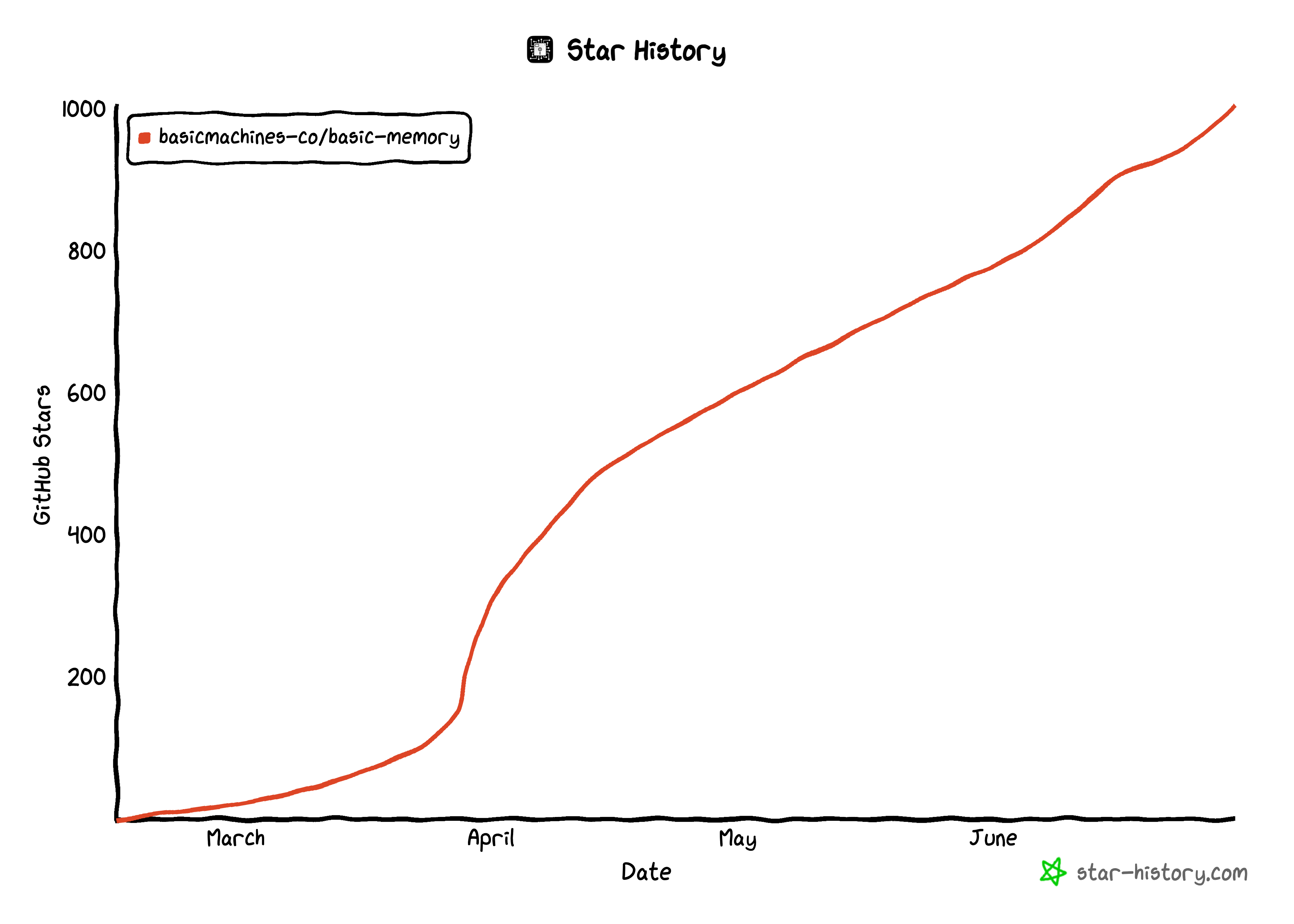Basic Memory Hits 1,000 GitHub Stars
From side project to community-validated AI memory tool in 6 months of grinding.
The Milestone
We did it! Basic Memory just crossed 1,000 GitHub stars (actually 1,004 as I write this). This is obviously a vanity metric, but it feels pretty good nevertheless.
Six months ago, this started as a personal itch - I was frustrated with how AI conversations would just… disappear. All that context, all those insights, gone the moment the chat ended. Then, start over with every chat, copy/pasting over and over again. What a mess. I wanted my knowledge to persist, to grow, to become something I actually owned and be useful.
Today, over 1,000 developers have starred the project, and people are using Basic Memory every day.

The Numbers Tell a Story
Here’s what 1,000 stars represents1:
- 6 months from first commit to this milestone
- 9 contributors from around the world
- 795 commits of continuous improvement
- 44 releases - we ship fast and often
- 96 GitHub issues with 72% resolution rate
- 81 pull requests with 86% merge rate
- 72 forks - people are building on our work
- 17 MCP tools for seamless AI integration
But the numbers that matter most? Daily active users who’ve integrated Basic Memory into their workflows, and the 29,400+ documentation page views from developers who spent an average of 4+ minutes learning how Basic Memory works. People sharing how they are using it in Discord. People who’ve told us it has become a part of their workflow. Honestly, when I hear about how people are using Basic Memory, as a repository for all of their knowledge to use with AI, it’s pretty incredible. Sometimes, I think “I can’t believe this actually works.” It’s really amazing and cool.
What Makes This Special
Basic Memory isn’t meant to be another note-taking app, it’s hardly an app at all, more a set of commands to work with notes, and some fancy search and query capabilities. It’s meant to be a kind of tool that bridges ways human and AI working and thinking:
User-First, Always
Your knowledge lives in markdown files you own. No vendor lock-in, no data harvesting, no “oops we got acquired and everything changes” surprises. Export everything anytime. Your data is yours.
AI-Native, But Human-Readable (and editable)
We use the Model Context Protocol (MCP) to give AI assistants access to your knowledge. But everything stays in plain markdown that you can read, edit, and understand. Want to change something? Go ahead, it’s just a text file. Update your knowledge and the AI can see them in real time.
Cross-Platform by Design
Works with Claude Desktop, VS Code, Obsidian, and any AI that supports MCP. Your knowledge isn’t locked to one AI provider or note-taking app.
The Community That Made This Happen
Looking at our GitHub, I see contributions, stars, and issues from Germany, China, the US, and beyond. People who:
- Reported bugs (and helped us fix them fast)
- Suggested features (many now shipped)
- Built integrations (expanding our ecosystem)
- Shared their workflows (inspiring new features)
The numbers show real community health: 96 issues (59% from external contributors), 81 pull requests with an 86% merge rate, and sub-24-hour response times on most issues. Basic Memory is an AI native software project. We use tools to help us write better code, more quickly. For many issues, we use @claude to inspect the issue, diagnose a problem, and sometimes come up with a PR with a fix and tests, all in minutes. But it’s not “vibe coding”, we look at every line of code and try to keep our test coverage exceedingly high (over 99%).
Special thanks to our contributors who have created both code and issues. You’ve helped shape Basic Memory into what it is today.
What’s Next
Hitting 1,000 stars isn’t the finish line - it’s validation that we’re building something people actually want. Here’s what comes next:
Basic Memory Cloud (Now in Public Beta)
A hosted version for those who want the power of Basic Memory without local setup. Same privacy principles, same user-first philosophy, just easier to get started and usable beyond the desktop. Join the public beta today!
Enhanced AI Integration
We’re exploring how AI can help organize and connect your knowledge automatically, inspired by recent academic research showing 2x reasoning improvements with better memory systems 2.
Enterprise Features
Teams are asking for collaboration features. We’re designing ways to share knowledge while maintaining the privacy and ownership principles that make Basic Memory special.
A Different Kind of Success
We’re not trying to be the next unicorn. We’re not taking VC money that would pressure us to prioritize growth over user value. We’re building something sustainable:
- 2,500 users would be a major success
- 10,000 users means we can work on this full-time
- Quality over quantity - we’d rather serve knowledge workers perfectly than everyone poorly
Thank You
To everyone who starred, forked, contributed, or just used Basic Memory - thank you. You made this milestone possible.
To those just discovering us - welcome! Try Basic Memory, join our Discord, let us know what you think. If you get stuck, ask us a question, we are here to help. We’re just getting started.
Ready to try Basic Memory?
- GitHub: https://github.com/basicmachines-co/basic-memory
- Documentation: https://docs.basicmemory.com
- Discord: Discord: https://discord.gg/tyvKNccgqN
- Youtube: https://www.youtube.com/@basicmachines-co
- Cloud Public Beta: https://basicmemory.com/beta
P.S. - This blog post was written in Basic Memory, with Claude helping me organize my thoughts. The AI had access to all my notes about the project, our goals, and our philosophy. It’s exactly the kind of seamless human-AI collaboration we built Basic Memory to enable.